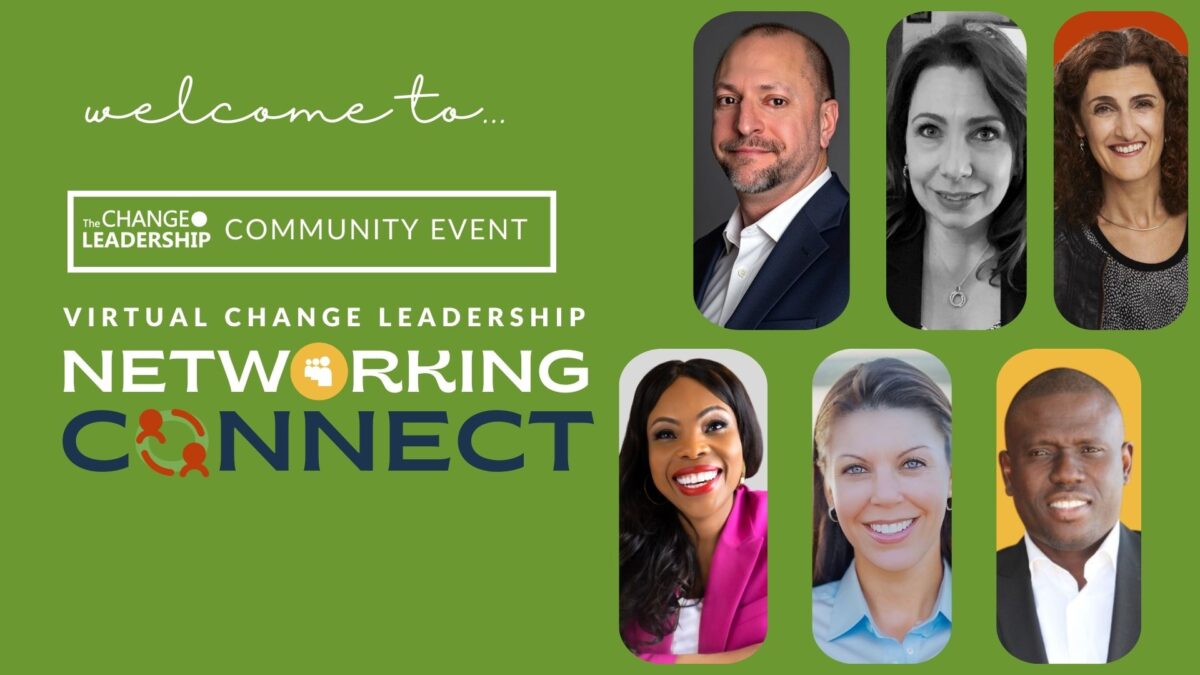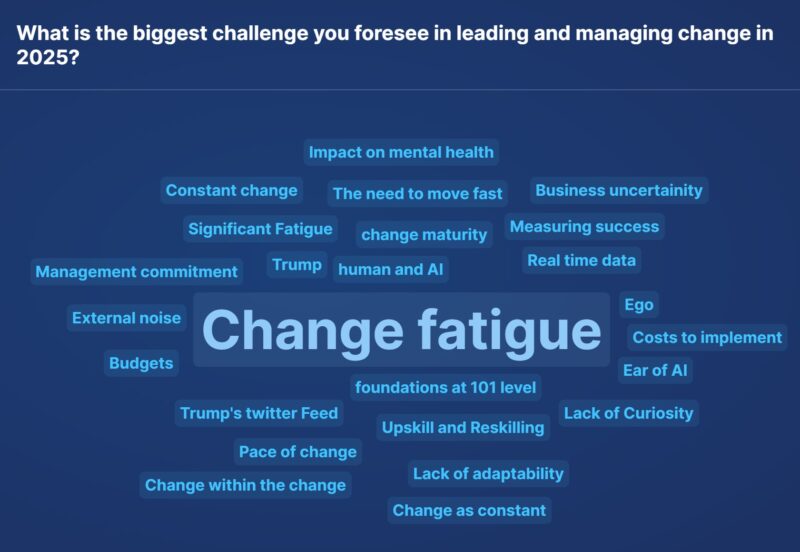Change Leadership Insights and Trends for 2025: AI, Human-Centered Leadership, and the Future of Work

The pace of change shows no signs of slowing down, and change leaders are tasked with steering their organizations through an increasingly complex and uncertain landscape.
Our recent Virtual Change Leadership Networking Connect community event brought together change leaders to discuss the trends, challenges, and strategies shaping the future of how we lead change. The discussion kicked off with a poll asking participants to identify the most significant trends for 2025. Topping the list were AI, uncertainty, and the shift to remote and hybrid work models.
These findings reflect the rapidly evolving technological and geopolitical landscape organizations are navigating.
Kate DeGon, the Founder & CEO, ChangeSync, discussed the shift from organizational change management to enterprise change management, where data from multiple projects is analyzed to provide predictive and prescriptive analytics. She highlighted the use of AI to focus on the people side of change and to drive change enablement.
Osa Uhunoma, a Change Management Lead at Lockheed Martin, discussed the use of data in their work, with Osa sharing how he uses data for readiness assessment, sustainable scorecard, and reinforcement assessment. He also emphasized the need for continuous learning and adaptability in the face of change.
Joel Carboni, Founder of the Sustainable Project Management organization, GPM Global and Change Leader Award Winner 2024. He explained that sustainability is no longer a ‘nice to have’ but a critical component of effective change leadership, citing three reasons: the stakes have never been higher, sustainability drives innovation and resilience, and stakeholder expectations are changing. He emphasized that change leaders must address systemic issues, prioritize sustainability, and demonstrate authenticity and transparency in their sustainability commitments.
Caroline Samne, a Senior Transformation Partner at The Pillars, pointed out, “There’s a danger of dehumanizing change efforts if we rely too heavily on AI and automation without maintaining the human element.” The human element remains crucial indeed as the human side of change emerged as a central theme throughout the conversation. Ochuko Igbeyi added that while AI is a tool, the human element is crucial in understanding the why behind change.
Daria Tippin, a Senior Change Manager at KPMG, shared her perspective on the importance of curiosity, adaptability, and a genuine focus on people in change management. She emphasized the need to expand beyond traditional frameworks and to use tools like the feelings deck and storytelling skills to better understand and manage change.

Cross section of attendees and speakers at networking event sharing insights.
David Clements, emphasized the need for authentic leaders to support AI, as it can lighten people’s remedial tasks and free up time for more profound work. Anthony Greenfield emphasized the importance of honesty and transparency in leadership, particularly during times of change. He highlighted the need to acknowledge the potential difficulties that may arise, such as job losses, and focus on enhancing roles and adding value.
Yvonne Ruke Akpoveta, Founder of The Change Leadership agreed, adding that change leaders must consider the impact of AI on roles and organizations, and be prepared to lead people through restructuring and role changes. Sinead Moylett’s group discussed the significance of human element in change management, stressing the need for upfront work, proper planning, and getting willing participation.
Yvonne noted, “We as change leaders are not only being impacted by the changes happening. We have to not only think about self-leadership, but also how we’re leading others through this uncertainty.” Kate summed it up best: “AI is another tool in our toolbelt, but it will never replace the human side of what we do. Focusing on that human-centered change leadership is ultimately important.”
As organizations continue to navigate turbulent waters, change leaders who can harness the power of data and technology while keeping the human experience at the forefront will be best positioned to guide their teams and organizations to success. By embracing adaptability, empathy, and continuous learning, change practitioners can navigate the changing tides of 2025 and beyond.
Below. we summarize the Key Trends, Challenges, and Recommendations that were addressed and discussed within the event.
Trends Shaping Change Leadership in 2025:
- Rapid and constant change driven by factors like AI, uncertainty, and the shift to remote/hybrid work
- Increased focus on sustainability, social equity, and the human impact of change
- Growing importance of data, analytics, and AI in informing and enabling change

Snapshot of our attendees thoughts on 2025 change trends
Key Challenges for Change Leaders:
- Addressing employee change fatigue and mental health concerns
- Navigating geopolitical uncertainty and its impact on organizations
- Upskilling and reskilling to stay relevant as roles and job requirements evolve

Responses to participants thoughts on the biggest challenge in leading and managing change in 2025
Recommendations for Effective Change Leadership:
- Leverage AI and data strategically to gain insights and automate routine tasks, but maintain a human-centered approach
- Cultivate emotional intelligence and empathy to support employees through change
- Advocate for flexible, trust-based timelines rather than arbitrary deadlines
- Prioritize continuous learning and adaptability as change leaders
- Integrate resilience-building and positive thinking to manage the mental health impact of change
Are you a change leader interested in creating your own Practical Playbook for Leading Change? Click HERE to join industry experts, change leaders, and forward-thinking professionals in gaining actionable strategies, insights, and tools to success!

Yvonne is a Change Management Strategist, Change Leadership Advocate, and Founder of The Change Leadership. With more than two decades of experience working with organizations to lead change, develop practical change leadership skills, and build real change capability beyond frameworks and performative transformation, Yvonne works with professionals, teams, and organizations globally to help them lead change with confidence in the face of continuous disruption. Connect with her on LinkedIn.




